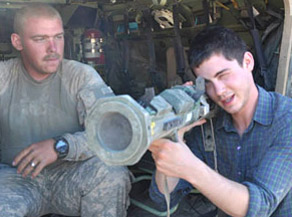|
|
Movie Review: FuryBy Matthew HuntleyOctober 23, 2014
When they return to base camp, the army’s lieutenant appoints the baby-faced Norman Ellison (Logan Lerman) to be Collier’s new assistant driver. Scared and inexperienced, Norman isn’t shy about telling the others, “I’ve never even seen the inside of a tank. I’m a clerk typist.” Norman is also expectedly naïve when it comes to combat and a moralist when it comes to killing the enemy. “It isn’t right,” he says, and at the beginning of the film, gentle Norman wouldn’t hurt a fly, but in just a matter of days, he not only becomes an accurate shot but also starts screaming F-bombs at the Nazis. His transformation from virgin soldier to full-fledged killer was a bit too quick and sudden to be fully believable. The film is more or less a series of scenes that show Collier and his unit moving from one German town to the next until the SS is completely wiped out. When they’re not in battle, they’re preparing for the next one, and these quieter moments allow the film to pause its brutality and reveal the human side of its characters, which we appreciate. An extended sequence finds Collier playing matchmaker to Norman and a hiding German girl (Alicia von Rittberg). “If you don’t take her into that room, I will.” Later on, the others interrupt and recollect a disturbing incident they experienced during their service. It’s a powerful moment but I honestly wasn’t sure what to take away from it. And that feeling really goes for the entire movie, because as thoughtful as the movie wants to be, it becomes clear the plot will simply boil down to a typical action-movie climax in which these five Americans face off against an entire German battalion. Ayer employs all the usual methods, like the heroes being able to kill numerous enemy soldiers in a single blow while the Germans barely nick the good guys, who must either die sensationally or martyr themselves. So what, then, is Fury good for other than showcasing savage violence and occasionally commenting on the chaos of war? Better films have already suggested just how bleak, miserable and terrible war can be, and while this one starts out this way, it gradually sensationalizes the violence to the point where it seems we’re supposed to cheer when enemy soldiers die. Some shots come across like a video game as men’s heads are blasted off or entire bodies are crushed by the tank’s tracks. I’ve no doubt such devastation occurred during World War II and other conflicts, but here it seemed the movie was merely trying to stir us up with imagery in order to compensate for a lack of a concrete narrative or well thought-out message. What is the message, exactly? I walked away from Fury uncertain and I wasn’t convinced war played out as narratively clean and action-oriented as it does here. In this day and age, when a movie claims to be “based on a true story,” we take it with a grain of salt because, as far as we can tell, the facts have been compromised for the sake of entertainment. But true stories still have value because we hope they keep the filmmakers in check to favor accuracy over Hollywood conventionalism. Had Ayer found a true account of a mission like this, one that more closely represents the tumultuous and unpredictable nature of war, we might have viewed it as a legitimate war drama rather than an action movie that happens to take place during a war.
|

|
|
|

|
Thursday, April 25, 2024
© 2024 Box Office Prophets, a division of One Of Us, Inc.


